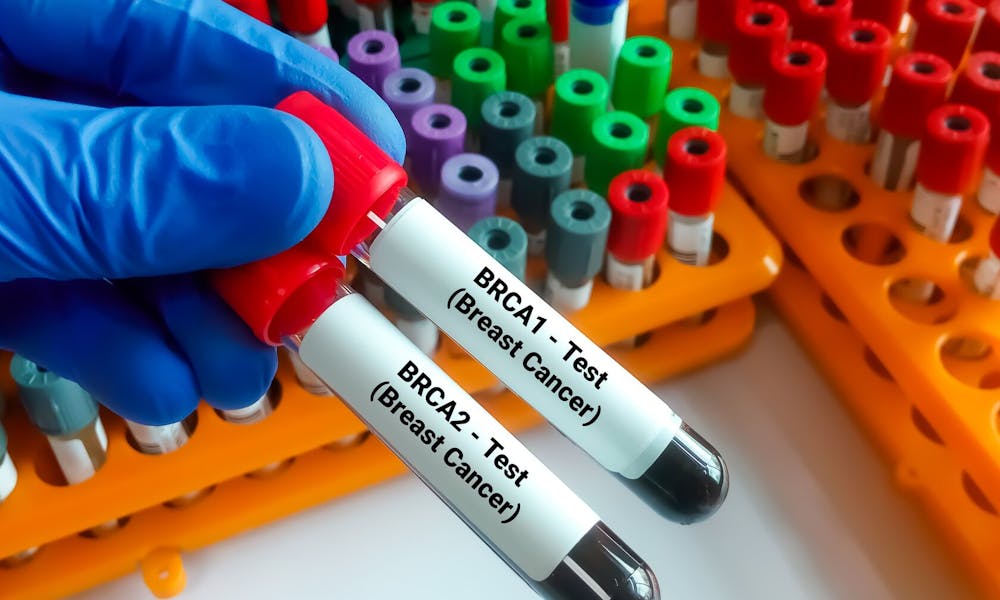A study of women just diagnosed with breast cancer found many have identifiable and well-understood gene abnormalities, yet are excluded from subsidised genetic testing that can guide their treatment.
According to Australian guidelines, women with newly diagnosed breast cancer should be offered genetic testing when they meet certain strict criteria - such as being diagnosed at a very young age or if many family members have had breast cancer - amounting to a 10% or more risk of having a rare, hereditary gene mutation.
The Melbourne-based study provided genetic testing to 474 women with newly diagnosed breast cancers irrespective of their risk of having a gene abnormality, such as BRCA1 or BRCA2 mutation.
Cancer-causing gene mutations were identified in 31 of the women and more than half (18) of these patients would not have been eligible for genetic testing under the current guidelines.
The study is a collaboration between the Parkville Breast Service (Peter MacCallum Cancer Centre, Royal Melbourne Hospital and Royal Women’s Hospital), the Parkville Familial Cancer Centre and WEHI (Walter and Eliza Hall Institute), and results are published today in the Medical Journal of Australia.
Peter Mac’s Professor Ian Campbell said the study showed that current Medicare-funded testing guidelines mean many patients miss out on vital information that could change the course of their treatment.
“Our study expanded this genetic testing to all women with newly diagnosed breast cancer and found 58% of patients identified as having a faulty gene had a risk factor of less than 10%, meaning these patients would not have been picked up under current screening guidelines,” said Prof Campbell, who is head of the Cancer Genetics Laboratory at Peter Mac.
“This demonstrates that more than half of breast cancer patients are missing out on their treatment being properly managed based on additional genetic information currently unavailable to them and their treating team.”
“The adoption of universal genetic testing for women with newly diagnosed breast cancer has the potential to improve outcomes by identifying hereditary mutations in patients and their families, leading to better treatment options and outcomes,” he said.
Approximately 5% of breast cancers occur in people who have inherited a gene abnormality from a parent.
WEHI’s Professor Geoff Lindeman said identifying these cases was vital to providing the best medical advice and intervention to patients and their wider families, and it often impacted surgery decisions.
“For example, a patient with a BRCA1 or BRCA2 gene mutation may choose to have a double mastectomy, rather than radiation therapy,” said Prof Lindeman, who is also a medical oncologist at Peter Mac and the Royal Melbourne Hospital.
“Similarly, a patient with a high risk of developing ovarian cancer might elect to have their ovaries removed as a preventative measure.”
“When a faulty gene is found, it also means family members can be tested and referred to a familial cancer clinic to manage their risk factor for developing breast or ovarian cancer.”
Professor Bruce Mann, Head of the Parkville Breast Service, said for most women in the study identified as having a gene abnormality, their recommended treatment changed as a result.
“With this additional information, the multidisciplinary team modified treatment recommendations for 77% of the women with hereditary mutations, including those not currently eligible for Medicare-funded testing,” Prof Mann said.
“We were able to incorporate this genetic testing into our existing multidisciplinary model of care, expediting treatment for patients.”
“Having their doctors initiate genetic counselling and testing streamlined the process and improved access to testing.”
Associate Professor Lesley Stafford, a clinical psychologist at the Royal Melbourne Hospital and the Parkville Familial Cancer Centre, said the research also found strong acceptance of genetic testing.
“Of the women who participated in our study, 87% agreed or strongly agreed that all women with breast cancer should be offered genetic testing,” she said.
“There was no decision regret among the participants in our study about having the genetic testing.”
The research was supported by funding from the National Breast Cancer Foundation and the National Health and Medical Research Council.


We provide a media service from 6am to 9pm each day. Journalists are welcome to contact our media adviser on-call via the RMH Switchboard on (03) 9342 7000.
During business hours, journalists can email mh-communications@mh.org.au. We do not respond to emails outside business hours.

